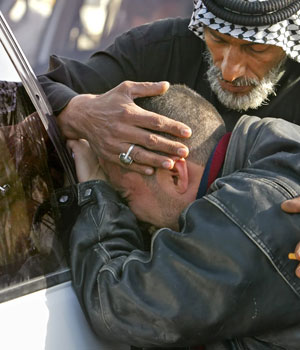
An Iraqi tries to calm his son as he mourns his friend, a militant in al-Mehdi Army, in Baghdad’s poor Sadr City neighborhood, 08 March 2006 (AFP)
BAGHDAD, (Reuters) – The bound and blindfold bodies of 18 men who had been strangled were found in a minibus in a mainly Sunni Arab district of the Iraqi capital, apparent victims of a sectarian war being waged by armed factions.
The identities of the 18 men were uncertain, police said on Wednesday. All had been strangled, although medical and police sources gave conflicting accounts as to whether they had been hanged or garrotted. Some bore signs of torture.
In another sign of the escalating violence, a roadside bomb hit a convoy of cars assigned to Iraq’s interior minister in Baghdad, killing at least one person, but minister Bayan Jabor, a Shi’ite, was not present, ministry sources said.
Jabor is a hate figure for Sunnis. His ministry has been accused by Sunnis and other groups of condoning death squads operating insidethe ministry targeting Sunnis. Jabor denies it.
The 18 bodies, several with bloodstains, were seen by Reuters reporters at the hospital. They were dressed in civilian clothes and were young and middle-aged men.
“We found a rope round the neck of one of the victims,” a source at Baghdad’s Yarmuk hospital said.
Similar incidents in the past have provoked anger among rival communities. The bodies were found just before midnight (2100 GMT) near the Amriya district of western Baghdad.
The area has been a stronghold of Sunni insurgent groups.
Local people have accused the Shi’ite-led, U.S.-backed government’s police and other security forces of abducting and killing Sunni civilians — an accusation the police deny.
The dumping of bodies exhibiting signs of torture and killed execution-style has become a feature of Iraq’s violence, which has raised fears that it may slide into all-out civil war.
Elsewhere, a roadside bomb in Falluja, west of Baghdad, killed four civilians and wounded two on Wednesday morning, police said. A similar bombing in central Baghdad killed two police officers and wounded two. Six civilians were also hurt.
Unrelenting violence overshadows a political process bogged down by factional rivalries. America’s senior diplomat in Iraq conceded on Tuesday that Iraq could yet descend into civil war.
Official figures and anecdotal evidence suggest an increase in sectarian killings since the destruction of a major Shi’ite shrine in Samarra on Feb. 22 sparked reprisal attacks.
Though a new parliament was called earlier this week by President Jalal Talabani, a Kurd, efforts to forge a grand coalition following an election in December have stumbled over Sunni and Kurdish refusal to accept that Shi’ite Prime Minister Ibrahim al-Jaafari should stay on.
His critics say he has failed to bring security or prosperity during the year in which he has been interim premier.
Angered by the opposition but divided over its response, the various parties in the United Iraqi Alliance, which dominates the new parliament, asked Talabani for a few days delay in Sunday’s planned opening of parliament.
But senior officials, including the outgoing speaker, said that was unlikely because March 12 is a constitutional deadline. Sunday’s session, however, may conduct essentially no business — not even the election of a new speaker demanded by the law.
Talabani will meet all parties on Thursday to agree a plan, officials said.
Senior Iraqi politicians say privately that their country, created by imperial Britain in 1918, risks breaking up into three warring states.
Defense Secretary Donald Rumsfeld, an architect of the 2003 invasion of Iraq, said on Tuesday: “There’s always been a potential for a civil war.” But he blamed the media for “exaggerating” Iraq’s problems.

An Iraqi policeman brandishes his gun to disperse people at the site where a car bomb exploded in Baghdad’s Zaafraniya district,07 March 2006 (AFP)

An Iraqi boy passes by a destroyed vehicle of an official convoy following a road side bomb attack in Baghdad, 08 March 2006 (EPA)
